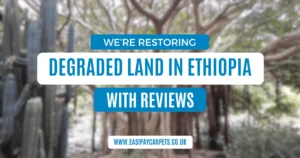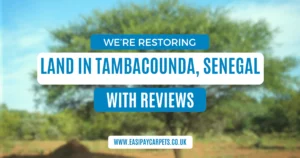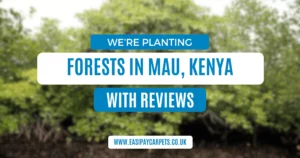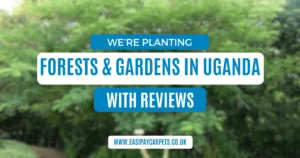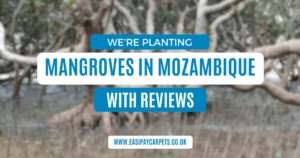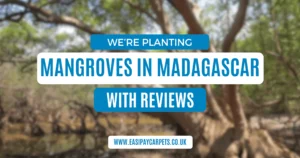
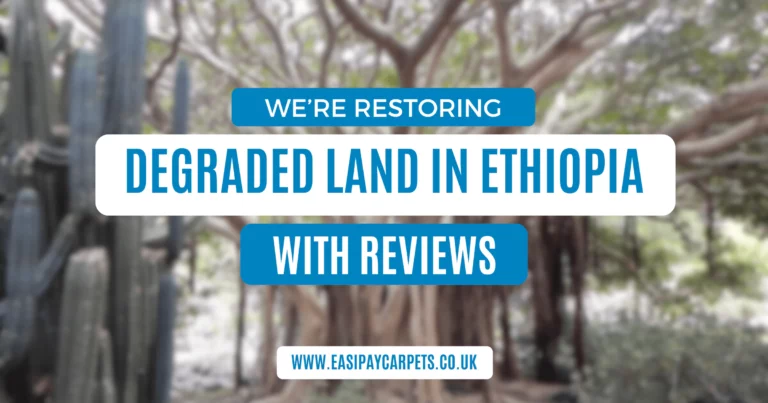
We're Restoring Land in Ethiopia!
Planting Trees? As a flooring company? You might think we’re mental, and we just might be, but since the start of 2024 we’ve been thanking our 5-star reviewers by planting a tree in their honour as part of our efforts to combat CO2. It’s an effort that started within the company in 2023 as we started to expand quicker than ever. There’s a lot we’re doing internally as a company, and the trees are one project we’ve made public.
But less about us, more about the trees – restoring land in Ethiopia, and this is why:
The Issues In Ethiopia:
Ethiopia’s climate varies widely across its regions, ranging from equatorial rainforests in the south and southwest, characterized by high rainfall and humidity, to arid, desert-like conditions in the eastern parts of the country. As one of the most drought-prone nations, Ethiopia faces increasingly unpredictable rainfall, exacerbating food insecurity across the country.
Deforestation is a significant issue throughout Ethiopia. According to Global Forest Watch, the country lost 19,800 hectares of tree cover in 2021 alone, and 4.2% of its humid primary forest was lost between 2001 and 2021. This widespread deforestation has severe consequences for local communities and the environment.
The Gewocha Forest, located in northwest Ethiopia, exemplifies the challenges faced by the nation. Deforestation and land degradation in this area are leading to a decline in the standard of living for residents. The lack of effective land management has resulted in poor soil quality and decreasing land productivity, contributing to high rates of poverty and malnutrition. In the Jabi-Tehnan region, where this project is based, half of the population lives below the poverty line, and 43% suffer from chronic malnutrition.
Although the Gewocha Forest is technically protected, the local government lacks the capacity to enforce these protections. As a result, farmers are increasingly encroaching into the forest to compensate for low crop yields and insufficient animal feed. Trees are being cut down for fuel wood, construction, and charcoal production, providing a crucial income source as farming income dwindles.
Addressing these challenges requires a multi-faceted approach that includes sustainable land management practices, reforestation, and support for alternative livelihoods. By implementing these strategies, it is possible to restore the environment, improve food security, and enhance the well-being of local communities.
Planting Partner
As a flooring company, we don’t have the connections to be able to just plant mangroves wherever we like. We’re working with Ecologi, who’ve teamed up with WeForest which develops a holistic approach to conserve and restore the ecological integrity of forest landscapes worldwide. Their strong experience with bioscience engineering and heaps of fieldwork mean they truly know what makes a forest thrive and to combat both the land issues for the people in Ethiopia as well as the global CO2 issues, planting large trees is the way forward, which we’re happy to help with!
What We’ve Planted So Far
Let’s start with the 29 Albizia gummifera we’ve planted. They grow up to 27 meters tall and grows well in a range of conditions. Being able to thrive under wet conditions and survive under dry seasons make it a great choice for the environment in which they’re planted.
Moving on to the 77 Ficus sur forssk we’ve planted – they grow differently at different elevations, anywhere from 12-40 metres but can grow coastally or as high as 2,500 metres. It grows really fast too, which makes it a great choice for storing CO2. Also, a trait we love is that wildlife and insects love this tree. It’s a hot spot for moths, butterflies and other insects as they absolutely love grazing on the leaves.
Lastly, our favourite tree potentially in all of our projects (though we do love the mangroves!) is the Ficus Vasta. We like them so much we’ve planted 107 of them. We like them because although they grow to a height of 25m, which is huge but not the tallest of our trees, they have a canopy which can reach 50m wide, which also means their root system must also be huge to compensate and keep them stood upright. The amount of CO2 a single tree can capture is insane. But the greatness doesn’t stop there! It produces figs.
These are edible, local communities eat them and they can be eaten straight off the tree like an apple or dried and stored for quite some time making them great options for places prone to famine during off seasons for food growth. Animals love them too, and they’re loved by sheep, goats, monkeys and birds which means that the Ficus Vasta captures tons of CO2, helps support localised climate and combat land degradation, helps feed local communities and combat famine, helps support livestock for communities and it also helps the wildlife of the area. We love this tree!
Update 17/10/24 – We’ve also added 20 Syzygium guineense. They can grow up to 25m in the right conditions and give edible fruits. It also has a sweet smell which attracts pollinators, which also improves local farms and maintains a healthy insect ecosystem.
Join Us in Making a Difference
At Easipay Carpets, we believe in giving back to the planet. For every 5-star review we receive, we plant a tree through our partnership with Ecologi. Together, we can contribute to vital reforestation efforts, restore ecosystems, and support local communities. Your positive feedback not only reflects our commitment to quality but also helps us make a tangible impact on the environment.
Thank you for helping us grow a greener future.
